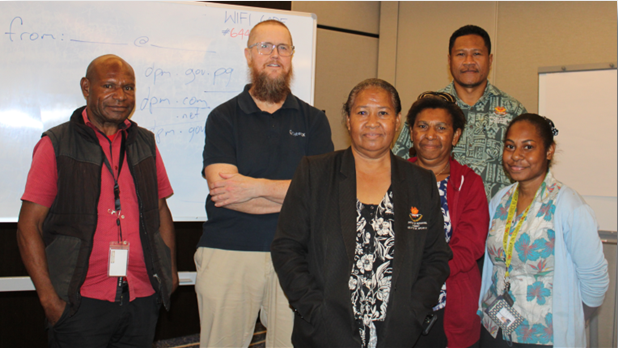DPM Staff Attend Cyber Crime Training

Nineteen officers from various divisions in the Department of Personnel Management were privileged to attend a short but important training on Cyber Crime, organized by the Department of Information and Communication Technology (DICT) and delivered by CyberCX Australia, on Wednesday 19th March at the Stanley Hotel, Port Moresby.
The training covered basics areas on cyber security and how users can best protect themselves, how these risks can be minimized and the role we play as government employees in PNG’s cyber security.
CyberCX principal consultant Dr. Halfpenny stated at the training that Papua New Guinea is vulnerable to cyber-criminal activities because the country shares borders with other Pacific islands nations, that’s why PNG is important.
“Government employees play an important role in PNG’s cyber security. You are the custodians of vital information and you have access to secure systems. A cyber attack on any government employee can have serious consequences. Your community and your country rely on you to be cyber safe” he said.
He outlined the types of cyber threats that can be encountered today such as;
Phishing – a type of cybercrime that uses email or other messaging systems like SMS or WhatsApp to trick a person.
Malware or Malicious Software- that can damage and steal information from computer systems.
Social Engineering- is when attackers trick people, into doing things that they shouldn’t do.
Password attacks- is when an attacker tries to get into your accounts by using a weak or easy to guess password.
Dr. Halfpenny also outlined some basic but key methods and ways in which a user can protect themselves from cybercrime and a threats.
They are ;
· Using strong and Unique passwords
· Using two-factor authentication
· Keeping your software updated
· Be careful of opening email links
· Changing default passwords
· Keeping your devices secured
· Only use approved apps
· Use a Virtual Private Network that makes a secure connection for your device.
Furthermore, he said staying safe online is an ongoing job and it is the responsibility of individuals to keep learning to stay ahead of threats. He urged participants to share what they have learnt from the workshop, with friends, families and colleagues as the more people know what to do, it will help them to stay safe online.
